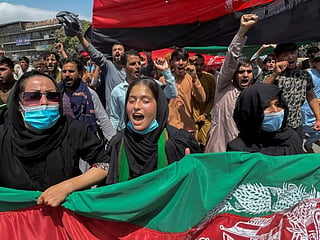Who exactly is Mohammad Hasan Akhund, Afghanistan’s new prime minister?
Akhund’s lack of military credentials seems to have worked in his favour

Three weeks after taking power in a blitzkrieg that stunned the international community, the Taliban have finally announced an interim government in Afghanistan.
The new government in Kabul is seen as a huge step for the group that is keen to re-establish their political control of a country, which witnessed an invasion by the US and its allies, following the 9/11 terror attacks. A-20 year long war, suffused with unmitigated suffering, ended with the complete withdrawal of US forces from Afghanistan on Aug. 31, 2021.
There has been an intense speculation in the last two weeks regarding the formation and composition of the new government in Afghanistan. While speculations and rumours swirled in Kabul and most Afghan experts put their money on Abdul Ghani Baradar as the next leader, the Taliban sprang another surprise with the announcement of Mullah Mohammad Hassan Akhund, a lesser-known leader of the group, as the interim prime minister.
It appears that the new leader is a compromise candidate between opposing factions within the Taliban. Although he held several important positions during the group’s previous government (Foreign Minister and Deputy Prime Minister), Akhund is not exactly a military man, neither is he considered among the A-listers within the highest echelons of Taliban.
Why Akhund, a ‘lightweight’ leader?
The candidature of Akhund seems to have received a boost because of his general acceptance to all major factions within Taliban. Seen as more of a religious scholar, who has authored several books, Akhund’s lack of military credentials seems to have worked in his favour. He is among the few notable names in the group who hasn’t participated in the original Afghan Jihad against the Soviets.
Considered close to the Taliban’s spiritual and supreme leader Mullah Hibatullah Akhundzada, Akhund was the head of the Taliban’s top decision-making body, Rehbar-e-Shura (leadership council) when he was named Afghanistan’s new leader.
As the group’s multiple factions wrangled over the shape of the new government in the last few weeks, there appeared to be a stalemate between the Kandahar faction of Taliban and the semi-independent Haqqani Network, which operates in eastern Afghanistan. Eventually everyone came around to agree on Akhund’s name.
A Kandahari Pashtun, Akhund, who is believed to be in his 60s, has studied in Pakistan and keeps a relatively low-profile. He is among the earliest members of Taliban, and has served as the governor of Kandahar also.
As head of Rehbar-e-Shura for close to two decades, Akhund has a formidable reputation within Taliban as a religious leader. Over the years he has worked in close quarters with Mulla Haibatullah Akhundzada and other members of the Quetta Shura.
During Taliban’s first stint in power (1996 to 2001), Akhund served as Foreign Minister and later as the Deputy Prime Minister under Mullah Mohammad Rabbani Akhund.
At the time of the US invasion in 2001, Akhun's name was added to the terror list of the United Nations.
Head of new Taliban government
Taliban supreme leader Haibatullah Akhundzada, in his first public statement since the group captured Kabul, said the group was committed to all international laws, treaties and commitments not in conflict with Sharia. Under the new dispensation, Mullah Baradar, a popular face of the Taliban, will serve as Akhund’s deputy.
Sirajuddin Haqqani, chief of the Haqqani Network, will lead the interior ministry. Mullah Yaqoob, son of Taliban co-founder Mullah Omar, will be the new defence minister. Amir Khan Muttaqi is going to be the new interim foreign minister of Afghanistan.
It remains to be seen how Akhund manages to handle the government that has elements from both the moderate and extremist factions of Taliban.
Taliban had initially promised an inclusive government that represents Afghanistan’s complex ethnic make-up, but the new cabinet seems to have little representation from the country’s non-Pashtun groups. No women have been named in the new government.
While critics note that this could all be an indicator of what is to come, Taliban insists that a more detailed announcement of the cabinet might have a broader representation.
“The cabinet is not complete; it is just acting,” Zabiullah Mujahid, official spokesman for Taliban, told the media at the Government Information and Media Centre in Kabul. “We will try to take people from other parts of the country.”
Where does Afghanistan go from here?
Since it captured Kabul, the group has been talking in a conciliatory tone but sceptics have their doubts. While the Taliban have repeatedly sought to reassure Afghans and foreign countries that they will not return to their last reign two decades ago, the announcement of the new government is an indication that things might not be as black and white.
Several members of the cabinet face US sanctions. Sirajuddin Haqqani, the new interior minister, for instance, is in the FBI’s wanted list.
While those complicated equations have yet to be worked out, the jury will be out on the man heading the new interim government. Can Mullah Akhund, himself a conservative, tweak his beliefs and gradually lift restrictions on women and ensure that all civil rights for ethic and religious minorities are protected in Afghanistan?
During the 1990s, edicts and diktats by Taliban — in their previous incarnation — like banning women’s education and forcing people to adhere to a certain puritanical approach to dress and socialising earned them much castigation from the international community.
Now as the group gets set to recalibrate their global image and formally take political control of the war-ravaged nation, will Akhund — and Taliban — overcome the pariah status? An anxious, apprehensive world awaits with a bated breath.
Sign up for the Daily Briefing
Get the latest news and updates straight to your inbox







